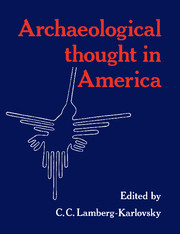Book contents
- Frontmatter
- Contents
- List of illustrations
- Introduction
- Part I History, method, and theory
- Part II Archaeology in the Americas and beyond
- 9 The structural analysis of Paleolithic art
- 10 Ancient China and its anthropological significance
- 11 Settlement pattern studies and evidences for intensive agriculture in the Maya Lowlands
- 12 The political economy of the Inka empire: the archaeology of power and finance
- 13 An epigenetic view of the Harappan culture
- 14 The use and abuse of world systems theory: the case of the “pristine” West Asian state
- 15 Mesopotamia, Central Asia and the Indus Valley: so the kings were killed
- 16 New tracks on ancient frontiers: ceramic technology on the Indo-Iranian Borderlands
- 17 Pastoralism and the early state in Greater Mesopotamia
- References
- Index
14 - The use and abuse of world systems theory: the case of the “pristine” West Asian state
Published online by Cambridge University Press: 06 July 2010
- Frontmatter
- Contents
- List of illustrations
- Introduction
- Part I History, method, and theory
- Part II Archaeology in the Americas and beyond
- 9 The structural analysis of Paleolithic art
- 10 Ancient China and its anthropological significance
- 11 Settlement pattern studies and evidences for intensive agriculture in the Maya Lowlands
- 12 The political economy of the Inka empire: the archaeology of power and finance
- 13 An epigenetic view of the Harappan culture
- 14 The use and abuse of world systems theory: the case of the “pristine” West Asian state
- 15 Mesopotamia, Central Asia and the Indus Valley: so the kings were killed
- 16 New tracks on ancient frontiers: ceramic technology on the Indo-Iranian Borderlands
- 17 Pastoralism and the early state in Greater Mesopotamia
- References
- Index
Summary
Recently archaeologists working in the Anglo-American regional tradition of archaeology have become increasingly critical of neo-evolutionary formulations for the development of complex society that stress internal, frequently ecological factors to the exclusion or near-exclusion of features relating to interaction and exchange among disparate societies at different levels of cultural development. Fried's concepts of a “pristine” social formation or society considered almost in isolation from other societies has been criticized as never operative or too ideal and misleading a type to be useful. Whether one prefers to refer to “peer polity,” “cluster,” or some other form of intersocietal interaction (Renfrew 1982a; Price 1977), the basic fact remains that the development or cultural evolution of any society is dependent upon its relations with other societies; that cultures are open, not closed, systems; and that studies – be they based on excavations of a site or settlement data from surveys of precisely defined, well-demarcated, but bounded areas – that fail to consider broader patterns of interaction are necessarily incomplete and partial. A boundary problem, in short, exists for prehistory that is every bit as real as that which besets later historical studies or analyses of the contemporary world.
One stimulating solution to this problem of defining the proper unit for social analysis, which, to date, has seen relatively limited application in prehistory, is the model of a world system developed by I. Wallerstein and his followers for explaining the emergence and current state of the modern world.
- Type
- Chapter
- Information
- Archaeological Thought in America , pp. 218 - 240Publisher: Cambridge University PressPrint publication year: 1989
- 27
- Cited by



